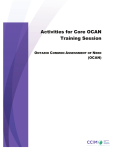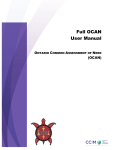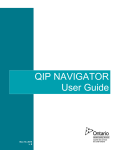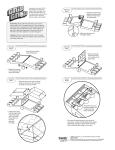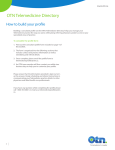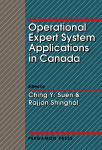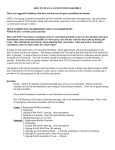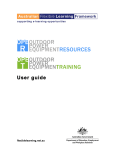Download Tab3a_Core_Activities_Outline_for_Training
Transcript
Activities for Core OCAN Training Session ONTARIO COMMON ASSESSMENT OF NEED (OCAN) These educational materials and the information contained herein are protected by the Copyright Act and are owned by the Ministry of Health and Long Term Care (MOHLTC). CCIM has obtained consent to use, copy and distribute these materials. These educational materials are proprietary to MOHLTC and may only be copied or distributed without MOHLTC's permission solely for educational and implementation purposes, provided that: (i) this notice is reproduced on all copies, (ii) these materials are not modified in any way or republished, (iii) these materials and not provided nor distributed alone or in conjunction with any other materials, (iv) these materials are not used in a commercial manner and/or distributed for money or other consideration, and (v) these materials are not posted or transmitted on any website. Reproduction of multiple copies of these educational materials, in whole or in part for the purposes of commercial distribution is prohibited. These educational materials are designed solely for use with the education and implementation support program provided by CMHCAP. These materials alone are not sufficient for a successful and complete OCAN implementation. The recipient of these materials, by its/their retention and use, agrees to protect these educational materials from any loss, theft or compromise. Under no circumstances including, but not limited to, negligence shall MOHLTC be liable for any direct, indirect, special, punitive, incidental, or consequential CMH CAP | Coordinator Training 2 Table of Contents Activities for Core OCAN Training Session ............................................. 4 a) Community Introductions ..................................................................................................................................4 Community Introductions Worksheet....................................................................................................................5 b) Getting to Know You Bingo ...............................................................................................................................6 Getting to Know You Bingo ..................................................................................................................................7 c) Introduce Your Partner .......................................................................................................................................8 Activity #1 Mental Health Functional Centre Use .................................................................................................9 Scenario 1: Counselling and Treatment Program...............................................................................................10 Activity #2 Housing definition..............................................................................................................................11 Activity #3 Develop an understanding of consumer’s situation using Core OCAN........................................12 Core OCAN ........................................................................................................................................................13 CMH CAP | Coordinator Training 3 Activities for Core OCAN Training Session Icebreakers Title a) Community Introductions b) Getting to know you Bingo c) Community Introductions Duration 30 minutes 20 minutes Group Size 12 or less participants 15-30 participants Optional Yes Yes 20+ minutes any size Yes Activities 1) Title Mental Health Functional Centre Use Duration 30 minutes Optional No 2) Housing Definition 10-15 minutes 3) Develop an understanding of a consumer’s situation using Core OCAN 60 minutes including debrief Group Size Small groups of 2 -4 or one large group working together Small groups of 2 -4 or one large group working together Small groups of 2 -4 No No a) Community Introductions Intent Community introductions are intended to involve the entire group of participants in the introduction of their classroom colleagues. People will learn many things about their group members depending on the type of question they ask. This is a great activity to debrief around questioning styles. Duration 30 minutes Group size Due to the rather long debrief for this activity, it’s recommended for group sizes up to 12 participants. Materials Community Introductions Worksheet (see next page) Participants will need paper / pens to record answers Name tags will help for participants who do not know each other How to facilitate Participants will ask questions of each of their colleagues, and there are three rules: 1. participants cannot answer a question they’ve already answered 2. participants cannot give more information than is asked in the question 3. questions must be open-ended, not yes/no questions Debrief What were some of the challenges of this exercise? What were some of the benefits of this exercise? CMH CAP | Coordinator Training 4 Community Introductions Worksheet Colleague Name CMH CAP | Coordinator Training Information 5 b) Getting to Know You Bingo Intent Get to know you Bingo is a game designed to introduce you to other workshop participants in a fun way. It works well even when you may already know the participants because you’ll get to learn something new about your colleagues. Duration Allow the participants 10-15 minutes to get the information or until someone yells “Bingo.” Debrief, if used, can take 5 minutes. Group size The best group size for Get to know you Bingo is 15 – 30 participants. Materials Bingo sheets (see next page) Pens, markers or pencils Room to move around & mingle How to play Each participant receives a bingo sheet. At the start of the game, participants get up and walk around the room introducing themselves to others and finding out whether people fit into the categories on the bingo form. Winning the game is at the discretion of the facilitator. For smaller groups winning can be just one completed line, horizontal, vertical or diagonal. Or, you can allow participants to record a person’s name more than once. For larger groups, filling the whole sheet will allow participants to meet more in the group. Consider not allowing participants to record a name more than once. The winner yells “Bingo” and will read back their winning results. The group will verify if the results are correct. Consider offering a token prize for the winner. Debrief What were some of the challenges of this exercise? What were some of the benefits of this exercise? CMH CAP | Coordinator Training 6 Getting to Know You Bingo ______________ had cereal for breakfast this morning ______________ traveled out of the country this past summer ______________ likes to watch television ______________ enjoys math ______________ rides a bike for exercise ______________ can speak more than 2 languages ______________ likes to play board games ______________ has an older sister ______________ is a really good cook ______________ likes the rain ______________ is afraid of spiders ______________ has a birthday in December ______________ would like to win one million dollars ______________ likes to play soccer ______________ can drive a motorcycle ______________ does not like candy ______________ can tap dance ______________ has been married for more than 2 years ______________ can play the piano ______________ has read all of the Harry Potter books ______________ would like to travel to France ______________ owns a pet bird ______________ does not like shopping ______________ can juggle ______________ is wearing something purple CMH CAP | Coordinator Training 7 c) Introduce Your Partner Intent Introduce your partner is an ideal activity for a group with even or odd numbers of participants. The intent is to get to know some key information about one or two people in close proximity to you. This icebreaker works best when the participants don’t know each other or they come from different HSPs. Duration Depending on the group size and debrief, this activity can take 20 minutes or longer. Group size Any size of group is fine. Debrief can be time consuming depending on the amount of information to be presented or the size of the group. If it is a particularly large group, choose one interesting fact to introduce your partner. Materials Flipchart / markers (optional) How to facilitate Ask the participants to break into pairs. If there is an odd number in your group, there may be one group of 3 participants. Depending on the information that’s important to gather, consider having participants answer the following questions from their partner: - person’s name HSP or department / program name length of time with the HSP most memorable moment at work most memorable moment not at work something unique about the person background / experience with training others To assist with memory, you may write these questions on a flipchart or whiteboard. The facilitator will ask the partners to introduce each other. Debrief What were some of the considerations in sharing the information about your partner with the larger group? What were some of the challenges of this exercise? What were some of the benefits of this exercise? CMH CAP | Coordinator Training 8 Activity #1 Mental Health Functional Centre Use Intent To give learners the opportunity to practice completing Part 5 of the Core OCAN, “Mental Health Functional Centre Use (for the last 6 months)” with information collected from a fictional scenario. Duration 30 minutes Group size This activity can be conducted with small break-out groups of 2 to 4, or as a bigger group working together. Materials Copy of scenario for each learner and partially completed Mental Health Functional Centre Use form (see next page) How to facilitate Explain the instructions for the activity to the group Set the time for completion Read the scenario out loud to the entire group Walk around the groups, if you’ve broken out into smaller work groups, provide assistance where necessary Provide correct answers and debrief with the larger group Scenario 1 Counselling and Treatment Program You are a program coordinator for a counselling and treatment program at an Aboriginal Health Access Centre (AHAC) where your main role is determining who may qualify for the program. You have just received a referral from a nurse practitioner from within the AHAC referring Natasha J. to your program on February 11th, 2009. You call and schedule an assessment appointment on March 1, 2009 where Natasha will meet with the primary worker and the psychiatrist. Following the assessment session, you review collateral information and present the information to the team. The team decides to accept Natasha into the ACT program on March 7, 2009. CMH CAP | Coordinator Training 9 Scenario 1: Counselling and Treatment Program You are a program coordinator for a counseling and treatment program at an Aboriginal Health Access Centre (AHAC) where your main role is determining who is suitable for the program. You have just received a referral from a nurse practitioner from within the AHAC referring Natasha J. to your program on February 11th, 2009. You call and schedule an assessment appointment on March 1, 2009 where Natasha will meet with the primary worker and the psychiatrist. Following the assessment session, you review collateral information and present the information to the team. The team decides to accept Natasha into the ACT program on March 7, 2009. Mental Health Functional Centre 1 OCAN Lead:* Yes No Staff Worker Name:* Staff Worker Phone Number:* Ext: Organization Name:* New City AHAC Organization Number:* 000 Program Name:* New City Counselling and Treatment Program Number:* 1111 Functional Centre Name:* Clinic/Program - Counselling and Treatment Functional Centre Number: 7*5 10 76 12 Service Delivery LHIN:* 6 Referral Source:* Other Community Agency Request for Service Date (YYYY-MM-DD): 2009-02-11 Service Decision Date (YYYY-MM-DD): 2009-03-07 Accepted: Yes Service Initiation Date (YYYY-MM-DD): Don’t know answer Exit Date (YYYY-MM-DD): Don’t know answer Exit Disposition: none Notes: _____________________________________________________________________________________________ _____________________________________________________________________________________________ _____________________________________________________________________________________________ CMH CAP | Coordinator Training 10 Activity #2 Housing definition Intent To give learners the opportunity to practice referencing the user manual for definitions to complete item #23 of the Core OCAN. Duration 10-15 minutes Group size This activity can be conducted with small break-out groups of 2 to 4, or one large group working together Materials User manual for each learner Copy of scenarios to complete for each learner Copy of User Reference Guide Explain the instructions for the activity to the group Have the large group break out into smaller groups of 2-4 Read the scenario out loud to the group Direct learners to the user manual to complete the activity while referencing the User Reference Guide Stress why its important to be familiar with standardized definitions in the User Reference Guide Refer to the User Reference Guide to identify the housing type in each of the following scenarios How to facilitate Instructions Scenario 1 Joe is new to your HSP and you learn about various parts of his life. Among the details you hear, Joe tells you that he lives with his parents in their home and does not pay rent. What is the Housing Type in this situation? Answer Key Accommodation – Private House/Apt. – Other/Subsidized Scenario 2 Susan has been in your HSP for several years. You are now completing a Core OCAN in your HSP. Susan Lives in Valley View Adult facility which is funded by the municipality and privately owned and operated What is the Housing Type in this situation? Answer Key Domiciliary Hostel – Municipal funded, privately owned and operated accommodation providing room and board. Note: while this may not be common, this provides the participants an opportunity to look up definitions. CMH CAP | Coordinator Training 11 Activity #3 Develop an understanding of consumer’s situation using Core OCAN Intent To give learners the opportunity to interpret Core OCANs they might receive and to gain a better understanding of the importance of completing Core OCAN accurately. Duration 60 minutes including debrief Group size This activity can be conducted with small break-out groups of 2 to 4, debrief in a larger group. Materials Copy of complete Core OCAN Paper to record notes How to facilitate Explain the instructions for the activity to the group Have the large group break out into smaller groups of 2-4 Set time limit Move about room to provide assistance if needed Read the instructions out loud to the entire group Instructions Review the completed Core OCAN provided in a small group. Discuss the information and what the client profile might be. Report back to the large group your understanding of the consumer’s situation. Answer key The scenario points us to the following assumptions: Tiffaney is a young aboriginal woman, a widow. She presents to the sandy Hill Community Mental Health Center asking for assistance in getting off the streets. She is form Northern Ontario, having come to Ottawa about a year ago. She has an elderly grandmother in Ottawa to whom she is attached, but who is living in a retirement home and cannot assist her. She has not found a family doctor, and does not share any information about a psychiatrist. She does not mention having connection with any other services in Ottawa at this time. She does not have a Power of Attorney, and indicated she has no concerns about her own capacity to manage her own affairs. (She has no money and no property) Tiffaney does share that she has had ‘problems” with depression and drugs for about 10 years, she does not want to tell any details of this and came to this HSP asking specifically to get help with finding a place to live and any other help that she would be able to get from the service. CMH CAP | Coordinator Training 12 Core OCAN Using CORE OCAN This agency is using the Core OCAN which comprises only the Consumer Information Summary and Service Use and not the Consumer Self-Assessment or Staff Assessment parts of OCAN. The Core OCAN captures the information that this agency reports as a community mental health service provider. Important points to communicate to the consumer: Use of consumer responses The answers consumers provide to questions in OCAN will be used to help them get the support they need. This information may only be used and shared with other agencies if they agree. A consumer may refuse to share any information they wish, and may change their mind at a later time. Choosing not to complete OCAN will not prevent consumers from receiving services. Information collected using the self-assessment represents their view of where they are today. Sharing that information can be an essential part of getting the services they need. They decide how and when their information is used and shared with others. Consumer consent The agency will provide a consent form to consumers with the OCAN assessment. The consent is the place for them to indicate their desire to use OCAN and how they want their information to be shared with others. CMH CAP | Coordinator Training 13 Start Date (YYYY-MM-DD)*: 2010-09-13 Consumer Information Summary 1. OCAN Lead Assessment OCAN completed by OCAN Lead?* Yes No 2. Reason for OCAN (select one)* Initial OCAN Reassessment (Prior to) Discharge Significant change Review Re-key Other (e.g., consumer request) ___________________________ 3. Consumer Information First Name: Middle Initial: Last Name: Preferred Name: Tiffaney Address: City: Province: Postal Code: Phone Number: Email Address: Date of Birth (YYYY-MM-DD):*2010-09-13 Estimate Unknown Health Card Number: 234-567-890 Version Code: RL Issuing Territory: Ontario Service Recipient Location (county, district, municipality):*Ottawa Ext: LHIN Consumer Resides in:* Champlain 3b. Gender (select one)* 3c. Marital Status (select one) Single Married or in common-law relationship Male Female Partner or significant other Widowed Other Consumer declined to answer Separated Divorced Unknown Consumer declined to answer Unknown 4. Mental Health Functional Centre Use (for the last 6 months) Mental Health Functional Centre 1 OCAN Lead:* Yes Mental Health Functional Centre 2 No Yes Staff Worker Phone Number:* Ext: 1237 Ext: Organization LHIN:* Champlain Organization LHIN:* Organization Name:* Sandy Hill Community Health Centre Organization Name:* Organization Number:* 00000 Organization Number:* Program Name:* Peer Support Program Name:* Program Number:* 01234 Program Number:* Functional Centre Name:* Functional Centre Name:* Functional Centre Number:* Functional Centre Number:* Service Delivery LHIN:* Champlain Service Delivery LHIN:* Referral Source:* Self Referral Source:* Request for Service Date (YYYY-MM-DD): 2010-09-13 Request for Service Date (YYYY-MM-DD): Service Decision Date (YYYY-MM-DD): 2010-09-13 Service Decision Date (YYYY-MM-DD): Accepted: Accepted: Service Initiation Date (YYYY-MM-DD): 2010-09-13 Service Initiation Date (YYYY-MM-DD): Exit Date (YYYY-MM-DD): Exit Date (YYYY-MM-DD): Exit Disposition: Exit Disposition: Mental Health Functional Centre 3 OCAN Lead:* CMH CAP | Coordinator Training No Staff Worker Name:* Staff Worker Name:* Susan Smith Staff Worker Phone Number:* 613-777-1111 OCAN Lead:* Yes Mental Health Functional Centre 4 No OCAN Lead:* Yes 14 No Staff Worker Name:* Staff Worker Name:* Staff Worker Phone Number:* Ext: Staff Worker Phone Number:* Ext: Organization LHIN:* Organization LHIN:* Organization Name:* Organization Name:* Organization Number:* Organization Number:* Program Name:* Program Name:* Program Number:* Program Number:* Functional Centre Name:* Functional Centre Name:* Functional Centre Number:* Functional Centre Number:* Service Delivery LHIN:* Service Delivery LHIN:* Referral Source:* Referral Source:* Request for Service Date (YYYY-MM-DD): Request for Service Date (YYYY-MM-DD): Service Decision Date (YYYY-MM-DD): Service Decision Date (YYYY-MM-DD): Accepted: Accepted: Service Initiation Date (YYYY-MM-DD): Service Initiation Date (YYYY-MM-DD): Exit Date (YYYY-MM-DD): Exit Date (YYYY-MM-DD): Exit Disposition: Exit Disposition: 5. Family Doctor Information Yes No Name: Phone Number: Ext: Email Address: Last seen: 6. Psychiatrist Information Yes No Name: Phone Number: Ext: Email Address: Last seen: 7. Other Contact Yes Contact Type: Family No None available Consumer declined to answer Address: City: Province: Postal Code: Unknown None available Consumer declined to answer Address: City: Province: Postal Code: Unknown Consumer declined to answer Unknown Name: Genevieve Kentillia Address: Thorwood Place Retirement Phone Number: 613-555-1111 Ext: Email Address: City: Ottawa Province: Ontario Postal Code: Last seen: 2009-12-25 Other Contact Yes Contact Type: Name: Phone Number: Ext: Email Address: Last seen: 8. Other Agency Yes Name: Phone Number: No Consumer declined to answer Unknown Address: City: Province: Postal Code: No CMH CAP | Coordinator Training Consumer declined to answer Address: City: Unknown 15 Ext: Email Address: Last seen: Province: Postal Code: 9. Consumer Capacity (select all that apply) 9a. Power of Attorney for Personal Care: Power of Attorney or SDM Name: Address: Phone Number: 9b. Power of Attorney for Property Power of Attorney: Address: Phone Number: 9c. Guardian Name: Address: Phone Number: 9d. Areas of concern Finance/property: Treatment decisions: Finance/property: Treatment decisions: Yes No Consumer declined to answer Unknown Yes No Consumer declined to answer Unknown Yes No Consumer declined to answer Unknown Yes Yes Yes Yes No No No No Estimate Estimate Estimate Ext: Ext: Ext: 10. Age in years for onset of mental illness: 10 11. Age of first psychiatric hospitalization: Unknown Unknown Unknown Unknown Consumer declined to answer Consumer declined to answer Consumer declined to answer Unknown Unknown Unknown N/A N/A N/A 12. Date when consumer first entered your organization (YYYY-MM): 2010-09-10 13. What culture do you (consumer) identify with? Mixed ethnic group 14. Aboriginal Origin (select one)* Aboriginal Non-aboriginal 15. Citizenship Status (select one) Canadian citizen Permanent resident Consumer declined to answer Temporary resident Refugee Unknown Consumer declined to answer Unknown 16. Length of time lived in Canada (number of years/months): 32 years 17. Service recipient preferred language:* English 18. Language of service provision:* English 19. Do you currently have any legal issues? (select one)* Civil Criminal None Consumer declined to answer Unknown 20. Current Legal Status (select all that apply) Pre-Charge Pre-charge diversion Court diversion program Pre-Trial Awaiting fitness assessment Awaiting trial (with or without bail) Awaiting criminal responsibility assessment (ncr) In community on own recognizance Unfit to stand trial Outcomes Charges withdrawn Stay of proceedings Awaiting sentence NCR Conditional discharge Conditional sentence Restraining order Peace bond Suspended sentence Other Custody Status ORB detained – community access ORB conditional discharge On parole On probation No legal problem (includes absolute discharge and time served – end of custody) Consumer declined to answer Unknown 21. Where do you live? (select one)* CMH CAP | Coordinator Training 16 Approved homes & homes for special care Correctional/probation facility Domicillary hostel General hospital Psychiatric hospital Other specialty hospital No fixed address Hostel/shelter Long term care facility/nursing home Municipal non-profit housing Private non-profit housing Private house/Apt. – SR owned/market rent Private house/Apt. – other/subsidized Retirement home/senior’s residence Rooming/boarding house Supportive housing – congregate living Supportive housing – assisted living Other _______________________ Consumer declined to answer Unknown 22. Do you receive any support? (select one)* Independent Supervised non-facility Assisted/supported Supervised facility 23. Do you live with anyone? (select one)* Self Spouse/partner Spouse/partner and others Children Parents Relatives Consumer declined to answer Unknown Non-relatives Consumer declined to answer Unknown 24. What is your current employment status? (select one)* Independent/competitive Non-paid work experience Assisted/supportive No employment – other activity Alternative businesses Casual/sporadic Sheltered workshop No employment of any kind Consumer declined to answer Unknown 25. Are you currently in school? (select one)* Not in school Vocational/training centre Elementary/junior high school Adult education Secondary/high school Community college Trade school University Other____________________ Consumer declined to answer Unknown 26. Psychiatric History 26a. Have you been hospitalized due to your mental health during the past two years? (select one)* Yes No Consumer declined to answer Unknown 26b. If Yes, Total number of admissions for mental health reasons: If Initial OCAN, list hospital admissions for the past 2 years OR if Reassessment, list hospital admissions since last OCAN Total number of hospitalization days for mental health reasons: If Initial OCAN, list total number of days spent in hospital for the past 2 years OR If Reassessment, list total number of days spent in hospital since last OCAN 26b. If Yes, Total number of admissions for mental health reasons: If Initial OCAN, list hospital admissions for the past 2 years OR if Reassessment, list hospital admissions since last OCAN Total number of hospitalization days for mental health reasons: If Initial OCAN, list total number of days spent in hospital for the past 2 years OR If Reassessment, list total number of days spent in hospital since last OCAN 27. How many times did you visit an Emergency Department in the last 6 months for mental health reasons?* None 2-5 CMH CAP | Coordinator Training Consumer declined to answer 17 1 >6 28. Community Treatment Order:* Issued CTO No CTO Unknown Consumer declined to answer Unknown 29. Diagnostic Categories (select all that apply)* This information is collected from a variety of sources, including self-report, and should not be used for diagnosis without being confirmed by a qualified diagnosing practitioner. Adjustment disorders Mood disorder Anxiety disorder Personality disorders Delirium, dementia, and amnestic and cognitive disorders Schizophrenia and other psychotic disorders Developmental handicap Sexual and gender identity disorders Disorder of childhood/adolescence Sleep disorders Dissociative disorders Somatoform disorders Substance related disorders Eating disorders Intellectual disability or impairment Factitious disorders Consumer declined to answer Impulse control disorders not elsewhere classified Unknown Mental disorders due to general medical conditions 30. Other Illness Information (select all that apply) Concurrent disorder (substance abuse) Dual diagnosis (developmental disability) Other chronic illnesses Other physical disabilities 31. What is your highest level of education? (select one)* No formal schooling Some secondary/high school Some elementary/junior high school Secondary/high school Elementary/junior high school Some college/university 32. What is your primary source of income? (select one)* Employment Social assistance Employment insurance Disability assistance Pension Family No source of income ODSP 33. Presenting Issues* Activities of daily living Attempted suicide Educational Financial Housing Legal Occupational/employment/vocational Physical abuse College/university Consumer declined to answer Unknown Other __________________________ Consumer declined to answer Unknown Problems with addictions Problems with relationships Problems with substance abuse Sexual abuse Specific symptom of serious mental illness Threat to others Threat to self Other __________________________ 34. Comments: Tiffaney was not comfortable talking about many issues. We will need to clarify her Aboriginal status and what band. Tiffaney said she was from Northern Ontario. Referral to crisis beds. Provided her with business card for addictions service and referral to local Indian Friendship Centre. Completion Date (YYYY-MM-DD)*: 2010-09-13 CMH CAP | Coordinator Training 18


















